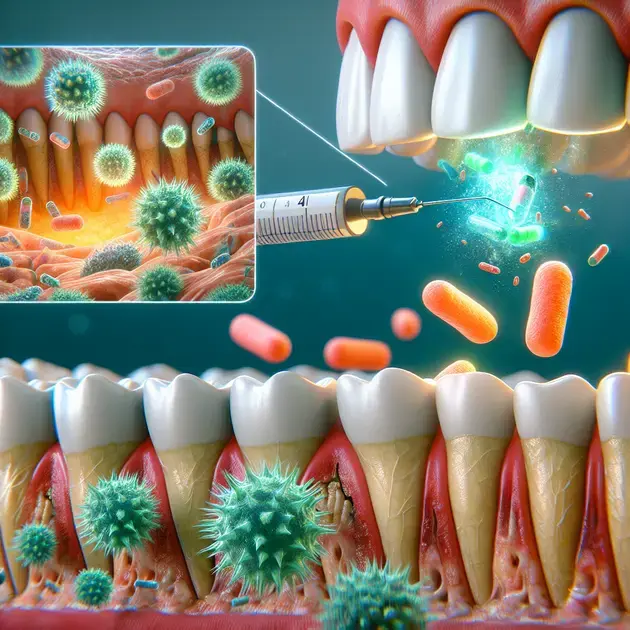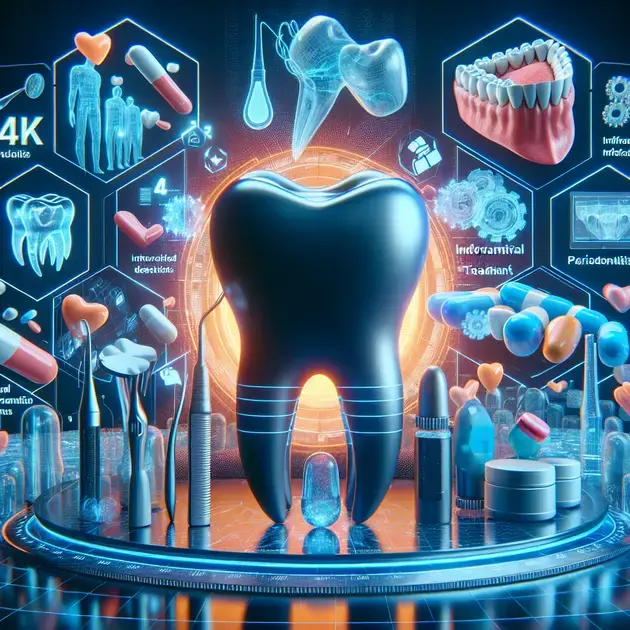When it comes to treating periodontitis, understanding medication plays a crucial role in managing the condition effectively. This comprehensive guide aims to provide you with detailed insights into the various medications available for periodontitis treatment.
With advances in dental research and technology, new medications and treatment approaches continually emerge, offering improved outcomes for individuals suffering from periodontitis. By gaining a comprehensive understanding of the medications used in periodontal treatment, you can make informed decisions about your oral health and well-being.

Understanding Periodontitis Medication Options
When it comes to exploring medication options for periodontitis, it is essential to consult with a dental professional for a personalized treatment plan. One common medication prescribed for periodontitis is an antimicrobial mouth rinse, such as chlorhexidine. This rinse can help reduce bacteria in the mouth, aiding in the management of gum disease.
Another medication option is oral antibiotics, which are sometimes prescribed to combat the infection and inflammation associated with periodontitis. Examples of oral antibiotics include doxycycline and minocycline. These medications can be effective in conjunction with professional dental cleanings and good oral hygiene practices.
In more severe cases of periodontitis, your dentist may recommend a prescription antimicrobial chip or gel. These treatments are placed directly into the pockets of the gums, delivering medication directly to the site of infection. This targeted approach can help reduce the size of periodontal pockets and promote healing.
For those considering natural or alternative remedies for periodontitis, essential oils such as tea tree oil have antimicrobial properties that may aid in gum health. However, it is important to discuss any natural treatments with your dentist to ensure they are safe and effective for your individual case.
By understanding the various medication options available for periodontitis and working closely with your dental provider, you can develop a comprehensive treatment plan to address the underlying causes of gum disease and improve your oral health.
Benefits of Advanced Medications for Periodontitis
The use of advanced medications in the treatment of periodontitis can offer several benefits for individuals with gum disease. One significant advantage is the ability of advanced medications to target specific bacteria that contribute to periodontal infection. This targeted approach can help reduce inflammation and promote healing in the gums.
Advanced medications for periodontitis often come in various forms, such as gels, chips, or mouth rinses, allowing for tailored treatment plans based on the severity of the condition. These specialized delivery methods can help ensure that the medication reaches the affected areas effectively, maximizing its therapeutic effects.
Furthermore, advanced medications for periodontitis may have fewer side effects compared to traditional antibiotics, making them a preferred choice for some individuals. Additionally, some advanced medications have been shown to promote tissue regeneration in the gums, aiding in the repair of damaged periodontal tissues.
By incorporating advanced medications into your periodontal treatment plan, you can benefit from targeted therapy, reduced side effects, and enhanced healing properties. Consult with your dental provider to learn more about the advanced medication options available for treating periodontitis.
Making Informed Decisions About Periodontitis Treatment
When it comes to making informed decisions about periodontitis treatment, it is crucial to educate yourself about the available options and work closely with your dental provider to develop a personalized plan. Start by scheduling a comprehensive dental exam to assess the extent of your gum disease and discuss treatment recommendations.
During your consultation, ask your dentist about the various treatment modalities available for periodontitis, including traditional therapies, advanced medications, and surgical interventions. Consider the benefits and potential risks of each option to make an informed decision that aligns with your oral health goals.
Take the time to research different medications and treatment approaches for periodontitis, including their mechanisms of action and expected outcomes. Websites such as the American Academy of Periodontology (perio.org) can provide valuable information on the latest advancements in periodontal care and treatment options.
Before starting any new medication or treatment for periodontitis, be sure to discuss any underlying health conditions or allergies with your dental provider to prevent potential complications. By staying informed and actively participating in your treatment decisions, you can take control of your periodontal health and achieve optimal outcomes.
Remember that successful treatment of periodontitis often requires a combination of professional interventions, effective oral hygiene practices, and ongoing maintenance to prevent disease recurrence. Stay proactive in your oral health care to enjoy a healthy smile for years to come.

Understanding Periodontitis Medication Options
Understanding periodontitis medication options is crucial for effectively managing this oral health condition. Periodontitis is a severe form of gum disease that can lead to tooth loss if left untreated. There are several medication options available to help control the progression of periodontitis and improve oral health.
One common medication for periodontitis is antibiotics, which can be prescribed to reduce the number of harmful bacteria in the mouth. These antibiotics can be taken orally or applied directly to the gums. Another medication option is antimicrobial mouth rinses, which can help to reduce plaque and prevent bacterial growth in the mouth.
In more severe cases of periodontitis, your dentist may recommend periodontal surgery in combination with medication. This may involve cleaning out bacteria from deep pockets in the gums and promoting gum tissue regeneration. Prescription-strength antimicrobial medications may also be used to control infection and inflammation.
It is important to work closely with your dentist to determine the best medication options for your individual case of periodontitis. By following your dentist’s recommendations and maintaining good oral hygiene practices, you can effectively manage periodontitis and improve the health of your gums.
Benefits of Advanced Medications for Periodontitis
Advanced medications for periodontitis offer several benefits for individuals dealing with this serious oral health condition. These medications are designed to target the root cause of periodontitis, which is the bacteria and plaque buildup that lead to gum inflammation and infection.
One of the main benefits of advanced medications for periodontitis is their effectiveness in reducing bacterial growth in the mouth. By controlling the levels of harmful bacteria, these medications can help prevent the progression of gum disease and protect the teeth and gums from further damage.
Advanced medications for periodontitis also offer a more targeted approach to treatment, focusing on specific bacteria strains that are known to contribute to gum disease. This targeted approach can lead to better outcomes and improved overall oral health for individuals with periodontitis.
Furthermore, advanced medications for periodontitis are often formulated with innovative ingredients that are proven to be effective in combating gum disease. These medications may also have fewer side effects compared to traditional treatments, making them a favorable option for many patients.
Overall, the benefits of advanced medications for periodontitis include improved treatment outcomes, targeted bacterial control, and reduced risk of side effects, providing a promising solution for individuals seeking effective management of their gum disease.
Making Informed Decisions About Periodontitis Treatment
When it comes to periodontitis treatment, making informed decisions is key to achieving optimal oral health outcomes. Periodontitis is a complex condition that requires a tailored treatment approach based on individual needs and severity of the disease.
Before starting any treatment for periodontitis, it is essential to consult with a dental professional who can assess your oral health and recommend the most suitable treatment options. This may involve a combination of professional cleanings, medication, and lifestyle changes to effectively manage gum disease.
By educating yourself about the available treatment options for periodontitis, you can make informed decisions about your oral health care and work collaboratively with your dental team to develop a personalized treatment plan. This may include regular monitoring of your gum health, adjusting medications as needed, and practicing good oral hygiene at home.
It is important to consider the long-term benefits of periodontitis treatment when making decisions about your oral health. Effective treatment can not only improve the health of your gums and teeth but also reduce the risk of complications such as tooth loss and systemic health issues associated with untreated gum disease.
Ultimately, by staying informed and actively participating in your periodontitis treatment plan, you can take control of your oral health and work towards achieving a healthier smile. Consulting with your dentist regularly and staying committed to your treatment regimen are crucial steps in making informed decisions about periodontitis treatment.
Conclusion
Understanding periodontitis medication options is imperative for effectively managing this severe oral health condition. Antibiotics and antimicrobial mouth rinses are common medications used to combat harmful bacteria and reduce plaque. In severe cases, periodontal surgery may be necessary, along with prescription-strength antimicrobial medications to control infection and inflammation.
Benefits of Advanced Medications for Periodontitis
Advanced medications for periodontitis target the root causes of the disease, effectively reducing bacterial growth and preventing gum disease progression. By focusing on specific bacteria strains, these medications offer better outcomes and improved oral health. Formulated with innovative ingredients, they also have fewer side effects compared to traditional treatments.
Making Informed Decisions About Periodontitis Treatment
When choosing periodontitis treatment, making informed decisions is crucial for optimal oral health outcomes. Consulting with a dental professional to develop a personalized treatment plan involving cleanings, medication, and lifestyle changes is essential. By staying informed, monitoring gum health, and following the treatment regimen, individuals can take control of their oral health and work towards a healthier smile.



